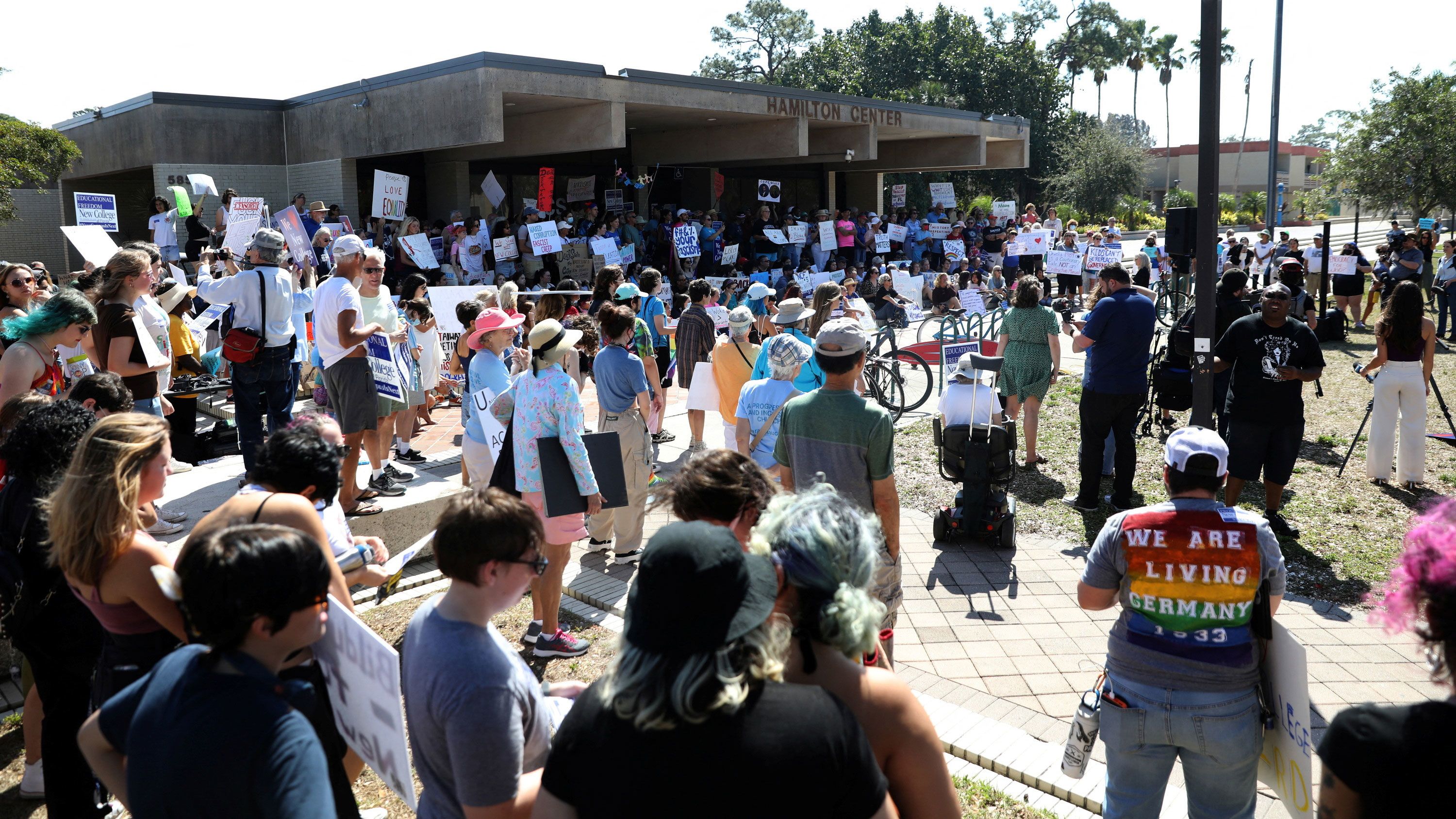
Faculty and Students Protest Against New College Board of Trustees!
Dear Commons Community,
New College of Florida’s Board of Trustees abolished the office handling diversity, equity and inclusion programs during a contentious and emotional meeting Tuesday that included testimony from students worried that a board reshaped by Gov. Ron DeSantis is making the school unwelcoming to minorities.
DeSantis appointed six members to New College’s board on Jan. 6 in an effort to transform the school, putting the small Sarasota institution at the center of the GOP’s nationwide pushback on education policies aimed at supporting historically marginalized groups, including racial minorities and LGBTQ individuals.
DeSantis has emerged as a key national figure in this debate after he pushed through legislation governing how K-12 schools discuss race and gender identity and recently prohibited an Advanced Placement course in African American studies, which caused an uproar. The governor is now taking aim at university programs.
Eliminating diversity, equity and inclusion (DEI) initiatives − which have become a major flashpoint for conservatives and a target of DeSantis throughout Florida’s public university system − is among the first substantive actions by New College’s revamped board, which also fired the former president last month and hired DeSantis ally Richard Corcoran as interim president. Corcoran’s first board meeting was Tuesday. As reported by USA Today.
Among DeSantis’ New College board appointees is prominent conservative activist Christopher Rufo, who pushed at his first meeting on Jan. 31 to abolish diversity programs.
The board opted to wait until more research could be done. College administrator Brad Thiessen presented the results of his DEI review Tuesday, delving into everything from faculty training to hiring practices and student admissions.
Thiessen said there was little mandatory diversity training and that only recently had prospective faculty been asked to submit a statement in their job application outlining how they would promote diversity.
Additionally, only one of the employees in the Office of Outreach and Inclusive Excellence was primarily focused on DEI programs. The others managed grants, worked on community outreach and performed other activities that aren’t controversial.
That led Trustees Grace Keenan and Matthew Lepinski to question whether the impacts of the DEI programs had been overstated.
“I’m concerned that we’re solving a problem that isn’t serious, or doesn’t really exist,” Lepinski said.
Keenan wondered if the board was spending a lot of time and energy on something that was relatively limited in scope. She suggested that the effort spent weeding out DEI programs was out of proportion to the amount of DEI that actually exists on campus.
“This is not a very impressive DEI bureaucracy,” Keenan said.
Keenan, Lipinski and Trustee Mary Ruiz voted against eliminating the diversity office.
Rufo conceded that DEI isn’t as deeply embedded in the college’s practices as he expected, but said it was still important to remove it on “principle.” Rufo and Trustee Matthew Spalding both suggested it is discriminatory to take race into account when setting the college’s priorities.
“It treats people differently on the basis of their skin color,” Rufo said.
“This is discrimination, it should be gone,” Spalding added.
The majority of trustees voted to have Corcoran move forward with eliminating the Office of Outreach and Inclusive Excellence, which handles DEI programs. The Office’s four employees will be offered other jobs.
Trustees also voted to eliminate the diversity statement when hiring faculty and to direct Corcoran to consider adopting a prohibition on diversity training for employees.
Additionally, the board voted to have Corcoran create a school policy that prohibits spending money on any DEI efforts.
Under the new regulation, DEI will be defined to include “any effort to manipulate or otherwise influence the composition of the faculty or student body with reference to race, sex, color, or ethnicity.”
The definition of DEI also would include: “Any effort to promote as the official position of the administration, the college, or any administrative unit thereof, a particular, widely contested opinion referencing unconscious or implicit bias, cultural appropriation, allyship, transgender ideology, microaggressions, group marginalization, anti-racism, systemic oppression, social justice, intersectionality, neo-pronouns, heteronormativity, disparate impact, gender theory, racial or sexual privilege, or any related formulation of these concepts.”
The rollback of New College’s diversity programs came at the end of a 3-1/2-hour meeting that featured emotional testimony for students, parents and others. About 200 people attended the meeting.
Disgraceful position on the part of the New College Board!
Tony


